
Marcello Vincenzo Domenico Mastroianni was an Italian film actor and one of the country's most iconic male performers of the 20th century. He played leading roles for many of Italy's top directors in a career spanning 147 films between 1939 and 1996, and garnered many international honours including two BAFTA Awards, two Best Actor awards at the Venice and Cannes film festivals, two Golden Globes, and three Academy Award nominations.
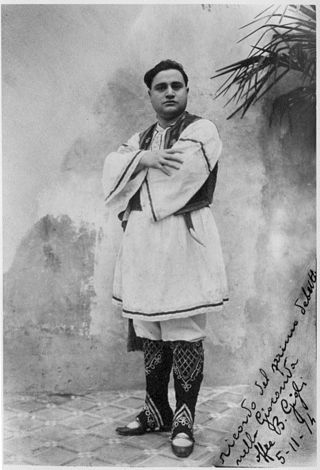
Beniamino Gigli was an Italian opera singer. He is widely regarded as one of the greatest tenors of his generation.
The Nastro d'Argento is a film award assigned each year, since 1946, by Sindacato Nazionale dei Giornalisti Cinematografici Italiani, the association of Italian film critics.

La terrazza is a 1980 Italian drama film directed by Ettore Scola. The all-star cast features the best of Italian Cinema of its era: Marcello Mastroianni, Ugo Tognazzi, Vittorio Gassman, Jean-Louis Trintignant, Serge Reggiani, Stefano Satta Flores, Stefania Sandrelli, Carla Gravina, Ombretta Colli, Milena Vukotic.

Luciano Emmer was an Italian film director. He was born in Milan, but most of his childhood lived in Venice.

Love Story is a 1942 Italian drama film directed by Mario Camerini and starring Assia Noris, Piero Lulli and Carlo Campanini. It is based on the play Life Begins by Mary McDougal Axelson, previously adapted into a 1932 film of the same title and a 1939 film A Child Is Born. Along with A Pistol Shot it marked an attempt to showcase Noris as a dramatic actress, rather than the White Telephone comedies she had become known for. It was screened at the 1942 Venice Film Festival.

Black Feathers is a 1952 Italian war drama film directed by Oreste Biancoli and starring Marcello Mastroianni, Marina Vlady and Camillo Pilotto. It was shot at the Titanus Studios in Rome. The film's sets were designed by the art director Ottavio Scotti.

Night Taxi is a 1950 French-Italian comedy film about a taxicab driver, directed by Carmine Gallone and starring Beniamino Gigli, Danielle Godet and Philippe Lemaire.

The Countess of Monte Cristo is a 1932 German comedy drama film directed by Karl Hartl and starring Brigitte Helm, Rudolf Forster and Lucie Englisch.

Der singende Tor is a 1939 German-Italian musical film directed by Johannes Meyer and starring Beniamino Gigli, Kirsten Heiberg, and Hilde Körber. It was a co-production made at Cinecittà Studios in Rome with a German director and a cast of mixed nationalities. The film's sets were designed by the art director Otto Guelstorff. A separate Italian version called Casa lontana was also made.
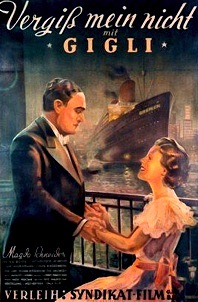
Forget Me Not is a 1936 British musical drama film directed by Zoltan Korda and starring Beniamino Gigli, Joan Gardner and Ivan Brandt. In the United States, it was released under the alternative title Forever Yours. The film was made at Isleworth Studios. It is a remake of a 1935 German film of the same title and one of four remakes of foreign-language films made by London Films. The film was not generally well-received by critics, although they praised Gigli's singing.
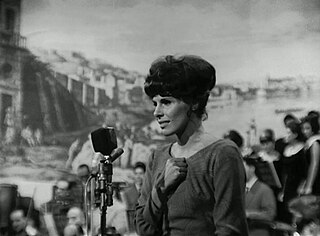
The Festival della Canzone Napoletana, commonly known as the Festival di Napoli, is a Neapolitan song contest. The first edition was held in 1952 and the last in 2004. From 1952 to 1970 the show was broadcast on RAI and from 1998 to 2004, in a differently spirited version, by Rete 4.

Two Bavarians in St. Pauli is a 1956 West German comedy film directed by Hermann Kugelstadt and starring Joe Stöckel, Beppo Brem and Lucie Englisch.

Love Me, Alfredo! is a 1940 Italian romantic drama film directed by Carmine Gallone and starring Maria Cebotari, Claudio Gora and Lucie Englisch. It portrays the relationship between an established opera singer and her lover an unknown composer. The title is a reference to Verdi's La Traviata. It was shot at Cinecittà Studios in Rome. The film's sets were designed by the art director Guido Fiorini.
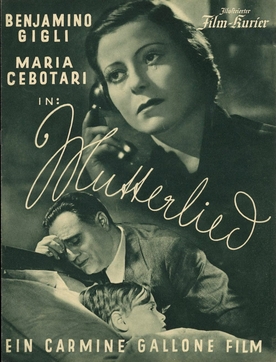
Mother Song is a 1937 German-Italian musical drama film directed by Carmine Gallone and starring Beniamino Gigli, Maria Cebotari and Hans Moser. It was produced by Itala Film, a Berlin-based production company with strong links to Italy.
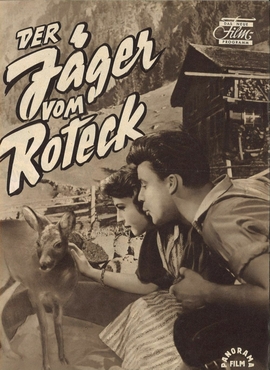
The Hunter from Roteck is a 1956 West German drama film directed by Hermann Kugelstadt and starring Michael Cramer, Doris Kirchner and Oskar Sima. It is a heimatfilm, made when the genre was at its peak.

The Dream of Butterfly is a 1939 musical drama film directed by Carmine Gallone and starring Maria Cebotari, Fosco Giachetti and Germana Paolieri. It is an variation of the plot of the opera Madame Butterfly. A co-production between Italy and Germany, two separate versions were produced in the respective languages. It is also alternatively titled Madame Butterfly. It was one of several opera-related films directed by Gallone following on from Casta Diva (1935) and Giuseppe Verdi (1938).
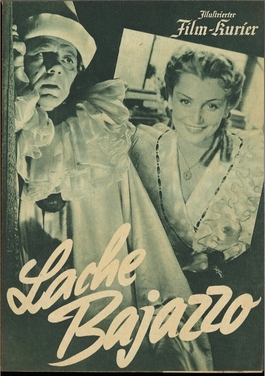
Laugh, Bajazzo is a 1943 German drama film directed by Leopold Hainisch and starring Paul Hörbiger, Claude Farell and Dagny Servaes. A separate Italian-language version Laugh, Pagliacci was also produced. The film's sets were designed by the art director Franz Koehn and Hans Kuhnert.

Laugh, Pagliacci is a 1943 Italian-German historical drama film directed by Giuseppe Fatigati and starring Alida Valli, Beniamino Gigli and Carlo Romano. A separate German-language version Laugh Bajazzo was also produced. It was shot in Berlin at a time when Nazi Germany and Fascist Italy were allies in the Second World War. The film's sets were designed by the art director Hans Kuhnert.

Finnish Beniamino Gigli Club is a Finnish society, founded in 1985 to promote the life work of the tenore Beniamino Gigli. It engages in cultural exchange between Finland and Italy by organizing opportunities for Finnish singers to sing in Recanati and, correspondingly, opportunities for Italian singers to sing at Beniamino Gigli memorial concerts in Finland.



















